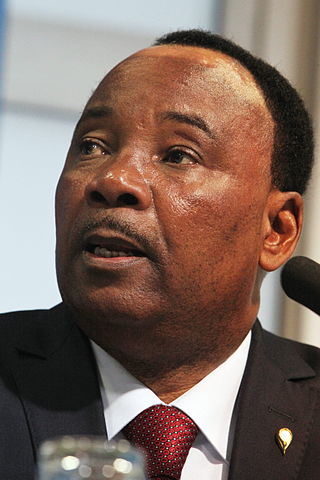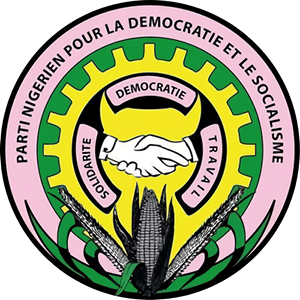
Politics of Niger takes place in a framework of a semi-presidential representative democratic republic, whereby the President of Niger is head of state and the Prime Minister of Niger head of government, and of a multi-party system. Executive power is exercised by the government. Legislative power is vested in both the government and the National Assembly.

General Ibrahim Baré Maïnassara was a Nigerien military officer and diplomat who ruled Niger from 1996 until his assassination. He seized and lost power in military coups.

Hama Amadou is a Nigerien politician who was Prime Minister of Niger from 1995 to 1996 and again from 2000 to 2007. He was also Secretary-General of the National Movement for the Development of Society (MNSD-Nassara) from 1991 to 2001 and President of the MNSD-Nassara from 2001 to 2009. Amadou is from the Kurtey, a Fula sub-group, and was raised in the Tillaberi Region, in the Niger River valley, north of Niamey.

Mamadou Tandja was a Nigerien politician who was President of Niger from 1999 to 2010. He was President of the National Movement for the Development of Society (MNSD) from 1991 to 1999 and unsuccessfully ran as the MNSD's presidential candidate in 1993 and 1996 before being elected to his first term in 1999. While serving as President of Niger, he was also Chairman of the Economic Community of West African States from 2005 to 2007.

Mahamane Ousmane is a Nigerien politician. Elected as the fourth President of Niger at 43 years old, he is the youngest elected president in Africa. He was also the first democratically elected president of his country, serving from 16 April 1993 until he was deposed in a military coup d'état on 27 January 1996. He has continued to run for president in each election since his ouster, and he was president of the National Assembly from December 1999 to May 2009. Since April 2020, he is the president of the Democratic and Republican Renewal, a major political party that is currently in opposition. RDR Tchanji formed an alliance with Ousmane's other political vehicle, MNRD Hankuri, on 16 December 2018.

Elections in Niger take place within the framework of a semi-presidential system. The President and National Assembly are elected by the public, with elections organised by the Independent National Electoral Commission (CENI).

Mahamadou Issoufou is a Nigerien politician who served as the president of Niger from 7 April 2011 to 2 April 2021. Issoufou was the prime minister of Niger from 1993 to 1994, president of the National Assembly from 1995 to 1996, and a candidate in each presidential election from 1993 to 2016. He led the Nigerien Party for Democracy and Socialism (PNDS-Tarayya), a social democratic party, from its foundation in 1990 until his election as president in 2011. During the presidency of Mamadou Tandja (1999–2010), Issoufou was the main opposition leader.

The National Movement for the Society of Development, also known as the National Movement for the Development of Society is a political party in Niger. Founded under the military government of the 1974–1990 period, it was the ruling party of Niger from 1989 to 1993 and again from 1999 until 2010, when a coup on 18 February 2010, by a military junta called the Supreme Council for the Restoration of Democracy (CSRD), ousted President Mamadou Tandja.

The Union for Democracy and the Republic is a political party in Niger. Its founding leaders were former Prime Minister Amadou Cissé and Amadou Madougou.

The Democratic and Social Convention - Rahama is a political party in Niger.

The Nigerien Alliance for Democracy and Progress is a political party in Niger. Moumouni Adamou Djermakoye led the party from its foundation in 1992 until his death in 2009.

The Nigerien Party for Democracy and Socialism is a political party in Niger. It is a broadly left-leaning party, part of the Socialist International; it came to power in 2011 following the election of the former long-time leader Mahamadou Issoufou. Mohamed Bazoum is the former President of the party and the former Secretary-General is Foumakoye Gado.
Amadou Boubacar Cissé is a Nigerien politician. He served as the Prime Minister of Niger on two occasions, from 8 to 21 February 1995 and again from 21 December 1996 to 27 November 1997. He has led a political party, the Union for Democracy and the Republic (UDR-Tabbat) since 1999. He was appointed as Minister of State for Planning in 2011.
Souley Abdoulaye was a Nigerien politician. He served as the Prime Minister of Niger from 28 September 1994 to 8 February 1995. He later served in the government under President Ibrahim Baré Maïnassara as Minister of Transport from 1996 to 1997 and then as Minister of the Interior, in charge of police and internal security, from 1997 to 1999.
Moumouni Adamou Djermakoye was a Nigerien politician and the President of the Nigerien Alliance for Democracy and Progress. He was an important minister during the regime of Seyni Kountché and subsequently served as Niger's Ambassador to the United States from 1988 to 1991; later, after founding the ANDP, he served as President of the National Assembly of Niger from 1993 to 1994. He was the ANDP's candidate in four presidential elections, beginning in 1993; he was also a deputy in the National Assembly from 1999 to 2009 and the President of the High Court of Justice from 2005 to 2009.

General elections were held in Niger in 1999; the first-round of the presidential elections was held on 17 October, with a run-off held alongside National Assembly elections on 24 November. The elections followed a coup d'état on 9 April, in which Ibrahim Baré Maïnassara, who had led an earlier coup in January 1996 and won disputed presidential elections, was assassinated. Coup leader Daouda Mallam Wanké initiated a transitional period that concluded with the victory of Mamadou Tandja, the candidate of the National Movement for the Society of Development (MNSD), over Mahamadou Issoufou, the candidate of the Nigerien Party for Democracy and Socialism (PNDS), in the run-off. The vote for the first National Assembly of the Fifth Republic, which had originally been scheduled for October, but delayed in August, also saw a victory for the MNSD, which won 38 of the 83 seats. It formed a coalition with the Democratic and Social Convention in order to gain a majority in the Assembly.

Hassoumi Massaoudou is a Nigerien politician who served as minister of Foreign Affairs of Niger from 2021 to 2023 and as minister of Finance from October 2016 to January 2019. A leading member of the Nigerien Party for Democracy and Socialism (PNDS-Tarayya), he was minister of Communication, Culture, Youth and Sports from 1993 to 1994, president of the PNDS Parliamentary Group from 1999 to 2004, director of the Cabinet of the President from 2011 to 2013, minister of the Interior from 2013 to 2016, and minister of National Defense in 2016.

The Alliance of the Forces of Change was one of the two large political coalitions which contested for power in Niger from 1991 to 1996.
Issoufou Assoumane is a Nigerien politician who has been President of the Union of Nigerien Democrats and Socialists since 2001. He served in the government of Niger as Minister of Mines and Energy from 1995 to 1996 and as Minister of the Environment from 2000 to 2001.
The 1996 Nigerien coup d'état was a military coup d'état which occurred on 27 January 1996 in Niamey, Niger. It ousted Niger's first democratically elected president, Mahamane Ousmane after nearly three years in power and installed General Ibrahim Baré Maïnassara as head of state. Prime Minister Hama Amadou was arrested in the coup and several soldiers and presidential guards were killed in the fighting.









